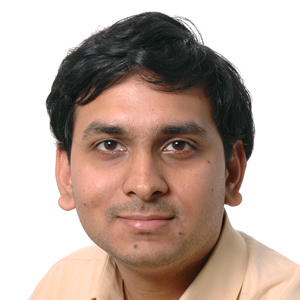
Mr. Ashwin Arunkumar Seshia is currently a Professor of Microsystems Technology at the Department of Engineering, University of Cambridge. He received his B.Tech. in Engineering Physics from IIT Bombay. This was followed by his MS and PhD in Electrical Engineering from the University of California Berkeley, USA, in 1999 and 2002 respectively, and MA from the University of Cambridge, UK, in 2008.
Prof. Seshia joined the faculty of the Engineering Department at the University of Cambridge in October 2002 where he is currently a Professor of Microsystems Technology and a Fellow of Queens College. He has held visiting appointments at Stanford University, University of California Berkeley, and IIT Bombay. Prof. Seshia is a co-founder of two companies that were formed to translate research outputs from his group and served on the boards of these companies for several years as a non-executive director. Prof. Seshia currently serves on the executive committee of the European Frequency and Time Forum and the International Steering Committee for IEEE MEMS. He has previously served on the editorial boards of the IEEE Journal of Microelectromechanical Systems (2009-2022); the IEEE Transactions on Ultrasonics, Ferroelectrics, and Frequency Control (2011-2021); the IEEE Transactions on Nanotechnology (2015-2017); the IOP Journal of Micromechanics and Microengineering (2015-2016) and the technical program committees of the IEEE MEMS conference; the IEEE Frequency Control Symposium; the European Frequency and Time Forum; the IEEE Sensors conference; and the IEEE International Electron Devices Meeting.
Prof. Ashwin Seshia’s contributions are in the field of microelectromechanical systems (MEMS), particularly sensors and sensor systems. His research interests encompass the designing and fabrication of MEMS, and understanding theoretical and practical limits to measurement using micro/nanofabricated devices including the modelling of noise and drift processes, nonlinear and scale-dependent effects, and physical origins of error and uncertainty. The insights derived are applied to the design and engineering of micro/ nanoelectromechanical devices for specific applications. Foundational research and translational contributions include the fields of resonant and mode-localized sensing, and the development of frequency-modulated gyroscopes, micromachined vibrating beam gravimeters, and vibration energy harvesting. He is a co-founder of two companies that were formed to translate research outputs from his group in the areas of energy harvesting-enabled sensor systems for industrial condition monitoring, and MEMS-based gravity and inertial sensing.
Amongst the many awards and accolades he has received in his vaunted career include Fellow, Royal Academy of Engineering, 2023; the ASME GM/Freudenstein Award, 2023; Fellow, Institution of Electrical and Electronics Engineers (IEEE), 2021; IEEE Sensors Council Distinguished Lecturer, 2020-2022; IEEE Sensors Technical Achievement Award in Sensor Systems (Advanced Career), 2018; Fellow, Institute of Physics, 2015; Fellow, Institution of Engineering and Technology, 2015; Young Alumnus Achiever Award, IIT Bombay 2013; Royal Society Brian Mercer Feasibility Award, 2010; and Fellow, ERA Foundation, 2008.
Any other interesting fact about yourself that you would like to share: I have several IIT alumni in my family.”
Hobbies: “Cycling, hiking, nature, travel, reading.”
